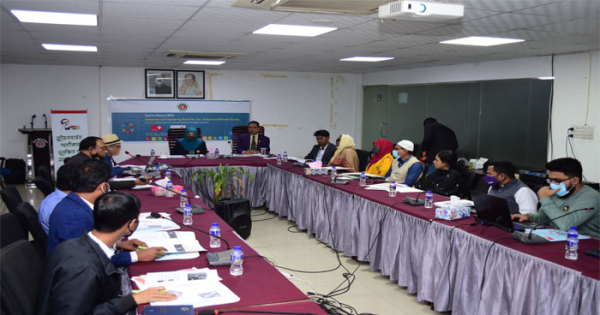Experience Sharing-SDG 16
Human Rights Education can be provided easily through Community Radio
Desk Report
প্রকাশিত: ১১:১৮ পিএম, ২৮ ডিসেম্বর ২০২১ মঙ্গলবার আপডেট: ১১:১৯ পিএম, ২৮ ডিসেম্বর ২০২১ মঙ্গলবার

The Chairman of the National Human Rights Commission Ms. Nasima Begum, ndc, said that it is possible to reach out to the grassroots people of the country through community radio and it is easy to disseminate human rights education through the community to the grassroots people. The National Human Rights Commission and Bangladesh NGOs Network for Radio and Communication (BNNRC) with the support of the Switzerland Embassy in Bangladesh organized an experience-sharing meeting at the conference room of the National Human Rights Commission.
She said most of us have a lack of understanding of human rights. They do not understand why human rights have been violated so many times. That is why human rights education is so important for everyone. She said that it was possible to reach out to grassroots people in remote areas of the country through community radio and for this, it is necessary to set up and operate community radios in all 64 districts of the country. Father of the Nation Bangabandhu Sheikh Mujibur Rahman devoted himself to the development of the country and believed that there is no difference between men and women, there is no difference between village and city and no one can be left behind. Public participation is one of the key issues in implementing the Sustainable Development Goals (SDGs).
Mr. AHM Bazlur Rahman, Chief Executive Officer, BNNRC presented the keynote address at the discussion. In his presentation, he mentioned that in the direction given by Father of the Nation Bangabandhu Sheikh Mujibur Rahman, there is no difference between men and women, there is no difference between village and city and no one can be left behind. Public participation is one of the key issues in implementing the Sustainable Development Goals (SDGs).
SDG-16: Connecting and Empowering Voices for Just Inclusive and Peaceful Society program, he said that to achieve SDG, all stakeholders need to be involved in the implementation process. If you succeed in achieving Goal 16, it will be much easier to achieve the other goals. ‘Peace, justice and strong institutions are all positively linked to other indicators of development. Not all conceptual issues related to objective 16 are equally important for Bangladesh. In this case, everyone including government and non-government organizations has to create a balanced situation. For example, in the current context of Bangladesh, if the establishment of 'peace, justice and strong institutions is considered more important, then it will be easier to develop all the people of Bangladesh. Bangladesh needs to involve the people in the various goals and issues of SDG 16. So, there is an opportunity to fix timely priorities. He mentioned that this program of BNNRC is working on localization of Radio SDG through 18 community radios at the local level and various activities are being implemented at the national level. He also recommended the involvement of community radios.
A total of 25 officials of the National Human Rights Commission participated in the discussion. M. Rabiul Islam, Deputy Director, Sushmita Pike, Deputy Director, Mohammad Touhid Khan, Assistant Director (IT), Farhana Syead, Public Relations Officer, Private Secretary to the Chairman and Farjana Najneen Tultul, Assistant Director took part in the discussion.
The meeting was chaired by Mr. Narayan Chandra Sarkar, Secretary of, National Human Rights Commission. He said people's participation is one of the key drivers in implementing the Sustainable Development Goals (SDGs). To achieve SDGs, all stakeholders need to be involved in the implementation process. If you succeed in achieving the 17 goals, it will be much easier to achieve the other goals and that is why goal 16, peace, justice and strong institutions are considered as the 'jewel' of the crown of sustainable development goals. "Peace, justice, and strong institutions are all positively linked to other indicators of development," he added. Not all conceptual issues related to objective 16 are equally important for Bangladesh.
In this case, everyone including government and non-government organizations has to create a balanced situation. For example, in the current context of Bangladesh, if the establishment of 'peace, justice and strong institutions is considered more important, then it will be easier to develop all the people of Bangladesh. Bangladesh needs to involve the people in the various goals and issues of SDG 16. So, there is an opportunity to fix timely priorities. Human rights issues have been highlighted in 157 out of 169 indicators of SDGs. So, everyone has to work with these.
